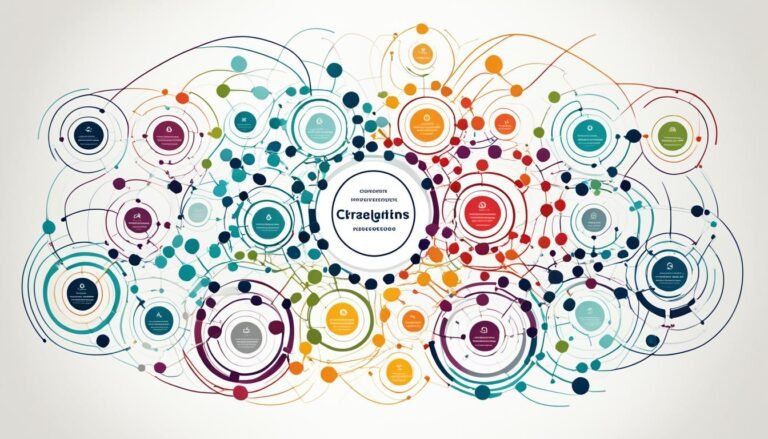Workers’ Compensation Insurance for Small Businesses
In Florida, if your business has four or more employees, you must get workers’ compensation insurance. It doesn’t matter if you run a small shop, a restaurant, or a construction site. This insurance is crucial. It helps your employees in case they get hurt or sick while working.
This insurance is key for small business owners. It takes care of medical bills and pay when workers are out. Plus, it keeps you on the right side of the law. It shields your business from being sued over work injuries. Let’s look deeper into what workers’ comp is and why it’s vital for your team’s safety.
Key Takeaways:
- Workers’ compensation insurance is mandatory for businesses in Florida with four or more employees.
- It provides coverage for medical expenses, lost wages, and disability benefits for injured employees.
- Workers’ comp insurance helps businesses comply with the law and protect against potential lawsuits.
- Small business owners should prioritize the safety of their employees and invest in workers’ compensation insurance.
- Failure to have workers’ comp insurance can result in penalties, including stop-work orders and potential criminal charges.
Who needs workers’ comp insurance in Florida?
In Florida, businesses must have workers’ comp insurance. But who needs it? We’ll look into Florida’s rules for workers’ compensation.
Businesses with four or more employees must have this insurance. The rule applies to both full- and part-time workers. Sole proprietors and partners are not counted for this. Yet, they can buy this insurance if they want.
For construction companies, the rules are stricter. They must insure every worker, including contractors. This rule protects everyone involved in construction jobs.
Agricultural businesses have their own rules, too. They need insurance if they have six or more year-round employees, or 12 or more seasonal ones. This law protects farm workers if they get hurt or sick on the job.
Independent contractors are not seen as employees. They typically don’t need workers’ comp unless in construction. If you’re a contractor in construction, getting this insurance is very important. It keeps you safe if you’re ever hurt at work.
Knowing who needs workers’ comp in Florida matters. It helps businesses follow the law and keep their workers safe. Be sure to know if you should have this insurance, even if there are exceptions for some.
Keep reading to learn why workers’ comp insurance is crucial. We’ll talk about the benefits it brings to businesses next.
Why is workers’ compensation insurance important for businesses?
Workers’ compensation insurance is crucial for protecting both businesses and their workers. It guarantees benefits for work-related injuries or illnesses. In Florida, this insurance is a must for businesses. Here’s why.
1. Coverage for Medical Expenses
This insurance covers all medical costs for incurring injuries or illness at work. It takes care of doctor’s visits, hospital stays, surgeries, and recovery. Employees don’t have to worry about big medical bills under this insurance.
2. Lost Wages Compensation
If an employee can’t work because of a work-related issue, workers’ comp helps fill in their lost wages. This support is crucial for employees to keep up with their bills while they recover.
3. Protection Against Lawsuits
It shields businesses from lawsuits due to employee injuries or illnesses. It offers the needed benefits to affected workers, reducing the chance they’ll sue. This keeps the work environment peaceful and supportive.
4. Compliance with Legal Requirements
In Florida, businesses with four or more employees must have workers’ comp. It shows they follow the law and care for their workers. This avoids penalties and supports a positive working culture.
Workers’ compensation isn’t just for protection, it helps create better workplaces. It covers medical costs, compensates lost wages, avoids lawsuits, and ensures obeying the law. It makes sure employees are safe and cared for, which is key for any business.
Do you need workers’ compensation if you are self-employed?
Workers’ compensation insurance helps employees with work-related injuries or illnesses. For self-employed people, the need for this insurance varies. It depends on what they do and whether there’s a risk.
Workers’ Comp for Self-Employed in the Construction Industry
In Florida, if you’re self-employed in construction, you must have workers’ comp insurance. This rule means you and any workers you have are covered for work injuries.
Working in construction is often risky. That’s why the law makes it a must for those working for themselves here. It ensures financial protection if accidents happen.
Workers’ Comp Coverage for Self-Employed in Low-Risk Industries
Some self-employed jobs are less risky and don’t legally require workers’ comp coverage. Yet, it’s still smart to consider it for your own safety.
Even in safer jobs, accidents can happen. Without coverage, you might face big financial hits. Workers’ comp can prevent these, offering support for injuries at work.
This type of insurance also helps with lost wages and injury expenses. It covers more than regular medical insurance. So, it offers wider protection.
Final Thoughts
For regular employees, workers’ comp is vital. For the self-employed, it’s optional in some industries and a must in others. But it’s wise to consider in any case for peace of mind. In risky jobs like construction, it’s essential. For lower-risk fields, it could be the key to avoiding financial stress from an injury on the job.
How much does workers’ compensation insurance cost in Florida?
Businesses in Florida need to know the price of workers’ comp insurance. On average, it costs $54 per month. But, this can change depending on a few things.
Factors affecting workers’ comp premium
The cost of workers’ comp depends on many factors. They include:
- Payroll: More payroll usually means a higher premium.
- Location: Rates differ by area due to local economy and risks.
- Number of employees: More workers might mean a higher premium.
- Industry: Risk levels by industry can change insurance costs.
- Coverage limits: Higher limits mean you pay more.
- Claims history: A history with many claims can raise the price.
These factors change with each insurance company. It’s smart to talk to different insurers. This way, you can find the best price and coverage for your business.
Saving money on workers’ comp insurance
There are ways businesses can save on insurance. Here are some tips:
- Classify employees correctly. Make sure each worker is in the right group to avoid overpayment. Talk to your insurer to get it right.
- Choose pay-as-you-go. This payment method matches premiums with your actual payroll. It can improve your cash flow, especially when payroll changes.
- Focus on safety. Creating a safe workplace and having safety programs can lower your costs. Insurers may offer discounts for having a good safety record.
By using these tips, you can reduce your insurance costs. Remember, regularly checking your policy and talking with insurance experts is key. This way, you can make sure you’re getting the best deal for your business.
| Factors Affecting Workers’ Comp Premium | Impact on Premium |
|---|---|
| Payroll | Higher payroll may result in higher premiums. |
| Location | Different areas within Florida may have varying insurance rates. |
| Number of employees | More employees generally lead to higher premiums. |
| Industry | High-risk industries, like construction, may have higher premiums. |
| Coverage limits | Higher coverage limits can result in higher premiums. |
| Claims history | Past claims can impact the premium, with frequent or costly claims potentially leading to higher premiums. |
Always talk to insurance experts for advice tailored to your business. They can give you specific guidance based on your situation.
How do workers’ compensation benefits work in Florida?
In Florida, workers’ compensation benefits are vital for those hurt on the job. They help cover many costs and ensure workers get needed care and compensation.
When a job-related injury occurs, an employee can claim benefits. They need to report the injury to their employer and file papers with the insurance.
These benefits help with medical costs related to the injury or illness. They cover doctor visits, surgery, medicine, and rehab. This eases the financial stress of medical bills for the worker.
Workers in Florida can also get temporary disability payments. These payments help replace lost wages when they can’t work. But remember, these payments are only a portion of what the worker usually earns.
If a worker gets a permanent disability, they may receive ongoing payments. These payments make up for the earnings the worker can’t make anymore. The amount and length of these payments depend on the disability’s severity.
Death benefits are available to family members if a worker dies because of a job injury. This support helps with funeral costs and gives ongoing financial help to the family.
The claims process often involves talks between the worker, their lawyer, and the insurance company. They try to agree on compensation. If they can’t agree, legal actions might be needed to solve the issue.
| Workers’ Comp Benefits in Florida | Coverage |
|---|---|
| Medical Expenses | Covers necessary medical treatment related to the work-related injury or illness. |
| Temporary Total Disability Payments | Provides partial replacement of lost wages for the duration of the employee’s inability to work. |
| Permanent Disability Payments | Compensates for the permanent loss of earning capacity caused by the work-related condition. |
| Death Benefits | Provides financial support and funeral expenses for dependents of deceased employees. |
Workers’ Comp Settlement Negotiation
Settlement talks aim to reach a fair compensation for the injured worker. They look at future medical needs and lost wages to figure out a fair amount.
If both sides can’t agree, the issue might go to a formal hearing or a lawsuit. Then, a decision on the compensation will be made by a judge or jury.
It’s wise for injured workers to get help from a workers’ compensation lawyer. A lawyer can protect their rights, help with the legal process, and ensure they get a fair settlement.
Florida’s workers’ compensation benefits are there to aid injured workers. They cover medical costs, offer disability payments, and assist the families of deceased workers. These benefits are meant to provide support and compensation after a work injury or illness.
What are the penalties for not having workers’ compensation in Florida?
In Florida, if employers don’t have workers’ compensation coverage, they could face big penalties. So, it’s vital for companies to follow the state’s workers’ comp rules. This helps them avoid legal trouble and keep their workers and operations safe.
Stop-Work Orders and Civil Penalties
Not having workers’ comp in Florida can lead to stop-work orders. A stop-work order makes a business stop working until they comply and pay a fine. So, without proof of coverage, normal business activities are off-limits.
The fine for a stop-work order is usually double the insurance premium of the last two years. It stands as a hefty penalty for not having workers’ comp insurance.
Criminal Charges and Legal Consequences
Ignoring a stop-work order can bring criminal charges. If found guilty, this could mean fines, penalties, or even going to jail. Thus, it’s a serious matter for employers who don’t offer workers’ compensation.
Penalties for Understating Payroll and Misrepresentation of Employees’ Duties
If a company underreports payroll or lies about workers’ jobs to dodge premium payments, they could get in trouble. These actions are seen as fraud and might trigger a stop-work order.
It’s key for employers to truthfully report their workers’ roles. This way, they ensure they have the right insurance and follow the law properly.
Death benefits under Florida workers’ compensation law
If someone passes from a work incident in Florida, their family might get death benefits. These benefits aim to help the family during a tough time.
Funeral expenses are a key part for the benefits. They take the financial stress off by paying for the funeral and burial.
For a surviving spouse, there’s help with continuing education. This support allows them to work towards future educational goals.
Dependents can also get financial help. They might receive up to 66.67% of the weekly wage, capped at $150,000 in Florida. This aid is vital for managing everyday costs.
Claiming these benefits involves working with the employer’s insurance. Sometimes, there are talks to settle the claim fairly with the help of a lawyer.
Here’s a table with a summary of benefits available under Florida law:
| Benefit | Details |
|---|---|
| Coverage for Funeral Expenses | Funds to cover funeral and burial costs |
| Education Benefits for Surviving Spouse | Financial support for continuing education |
| Compensation Benefits for Dependents | Up to 66.67% of the decedent’s weekly wage, maximum of $150,000 |
Understanding these benefits is key to the family’s future. Talking to an expert in workers’ comp law can help get all the support needed.
Workers’ comp settlements in Florida
In Florida, some workers might want to get a bigger settlement in their workers’ comp cases. They carefully figure out how much the injury or illness will cost. Then, they talk with the insurance company and their lawyer to agree on a fair amount.
To make sure the settlement is right, both sides need to know the law and money matters. They try to agree on a payment that covers the worker’s medical costs, lost income, and the pain they’ve gone through.
Both sides look at the facts like tests and reports, what experts say, and what witnesses saw. They also think about how likely they are to win in court and how much time and money it would take.
Figuring out the costs includes looking at doctor bills, any future treatments, wages the worker didn’t get, and how life has changed due to the injury or illness. These details help set a fair pay amount.
The discussions about what the payment should be can go back and forth many times. The worker’s lawyer supports and advises them, making sure their rights are looked after.
If they can’t agree by talking, the case might go to a workers’ comp judge. Sometimes, the only way to get a fair deal is through a lawsuit.
Example Settlement Calculation
Imagine an employee breaks a leg at work. The costs for the settlement could be:
| Expenses | Cost |
|---|---|
| Medical bills (surgery, hospital stay, rehabilitation) | $15,000 |
| Lost wages during recovery period | $5,000 |
| Future medical expenses (physical therapy, follow-up appointments) | $2,000 |
| Pain and suffering | To be determined |
In this example, the expected total cost is $22,000. But, the final number could change. It depends on things like the proof of what happened, if the worker might have a long-term problem, or if the worker is partly to blame.
Each case is different. The settlement amount is always linked to what happened in the injury or illness. It’s smart to get advice from a skilled workers’ comp lawyer. They can help you through the process and aim for the best result.
Statute of limitations for workers’ compensation claims in Florida
In Florida, the statute of limitations for work injury claims is two years. This starts from the injury’s date. Injured workers must file claims within this time to get their benefits. So, knowing and following the time limit is key to protecting your rights.
There are cases that go beyond the two-year limit, such as with minors or incompetents. Also, if the employer misleads or exploits the worker, they might still claim benefits. It is essential to check if any exceptions apply to your case.
Moreover, there’s no specific time limit for care linked to prosthetic devices. Those needing prosthetics due to work injuries can get ongoing support. No matter how long it’s been since the injury, this care is still available.
Exceptions to the statute of limitations for workers’ compensation claims in Florida
| Exception | Description |
|---|---|
| Minors | Injured workers who were minors at the time of the injury may have an extended time to file a claim. |
| Mentally incompetent individuals | If an injured worker is mentally incompetent, the statute of limitations may be tolled until they regain competency. |
| Worker exploitation | If an employer engages in exploitation or fraud related to a workplace injury, the injured worker may still be able to file a claim beyond the usual time limit. |
| Failure of insurance carrier to inform | If the insurance carrier fails to properly inform the injured worker of their rights and the time limit for filing a claim, the time limit may be extended. |
Knowing the statute of limitations and any applicable exceptions in Florida is vital for injured workers. Missing the deadline to file a claim can mean losing benefits. It’s smart to talk with a workers’ comp lawyer. They can ensure you meet the time limit and safeguard your rights.
Conclusion
Workers’ compensation insurance is a must for small businesses in Florida. It protects the company and its workers. This insurance covers medical bills, lost income, and disability pay if someone gets hurt or sick at work.
By following the state’s rules on workers’ comp, small businesses can stay clear of fines. These fines could mean having to stop work or even facing criminal charges.
It’s vital for small business owners to get the right workers’ comp coverage. Doing this shows they care for their team and meet legal requirements. Thus, they can protect their business, deal with financial risks, and achieve lasting success.
In Florida, getting workers’ compensation insurance is important for small businesses. This insurance is key for paying medical bills and lost wages. It also keeps businesses out of legal trouble and away from fines.
By caring about their workers and having the right insurance, small businesses can do well in a tough market.
FAQ
Q: Who needs workers’ comp insurance in Florida?
A: In Florida, businesses with four or more employees must have workers’ comp. Every worker in construction should be covered. Special rules apply to sole proprietors, partners, and farm businesses. Independent contractors in construction need coverage too.
Q: Why is workers’ compensation insurance important for businesses?
A: Workers’ comp helps with medical bills and recovering from injuries. It keeps businesses legal and guards against lawsuits about worker harm.
Q: Do you need workers’ compensation if you are self-employed?
A: If you’re self-employed in construction in Florida, you need workers’ comp. Other self-employed folks might not need it by law. But, having it can protect you and is a smart choice.
Q: How much does workers’ compensation insurance cost in Florida?
A: In Florida, workers’ comp costs an average of per month. Your specific cost depends on things like your business’s size, location, and history of claims.
Q: How do workers’ compensation benefits work in Florida?
A: In Florida, workers’ comp helps with medical, temporary disability, and death benefits. To get these benefits, you file a claim against your employer’s policy. If you can’t agree, a hearing or lawsuit might be necessary.
Q: What are the penalties for not having workers’ compensation in Florida?
A: Employers in Florida face stiff penalties for operating without workers’ comp. This includes stop-work orders that need to be fixed quickly to avoid criminal charges. The penalty can be twice what they would have paid for insurance in the last two years.
Q: What are the death benefits under Florida workers’ compensation law?
A: If an employee dies because of work in Florida, their family could get death benefits. This money helps with funeral costs and supports the family. It’s up to 66.67% of the person’s weekly wage, capped at 0,000.
Q: How do workers’ comp settlements work in Florida?
A: Sometimes, Florida workers want a bigger settlement. This means figuring out all the costs and talking with the insurance company and lawyers. If they can’t agree, they might end up in court.
Q: What is the statute of limitations for workers’ compensation claims in Florida?
A: In Florida, workers have two years to file a compensation claim after getting hurt. There are exceptions, like if you’re a minor or weren’t told correctly by the insurance company. For medical devices, there isn’t a time limit.
Source Links
- https://www.insureon.com/small-business-insurance/workers-compensation/florida
- https://www.nextinsurance.com/workers-compensation-insurance/florida/
- https://www.myfloridacfo.com/docs-sf/consumer-services-libraries/consumerservices-documents/understanding-coverage/consumer-guides/small-business-guide.pdf?sfvrsn=6c0b1e26_6







